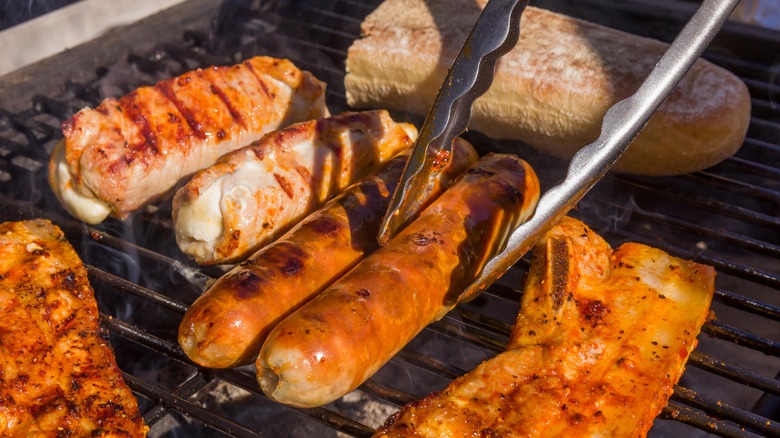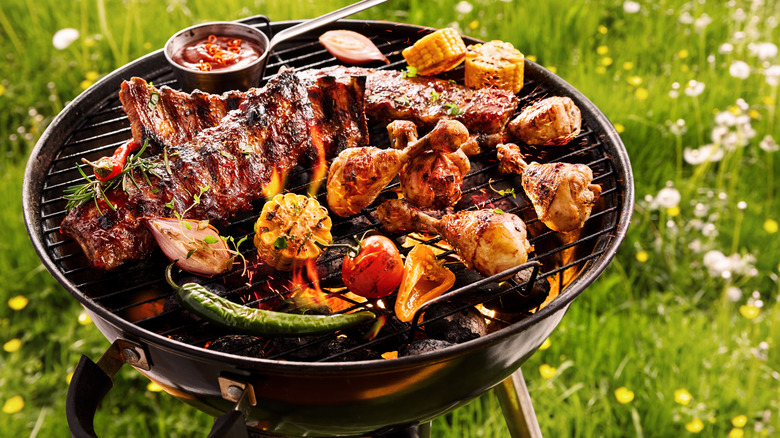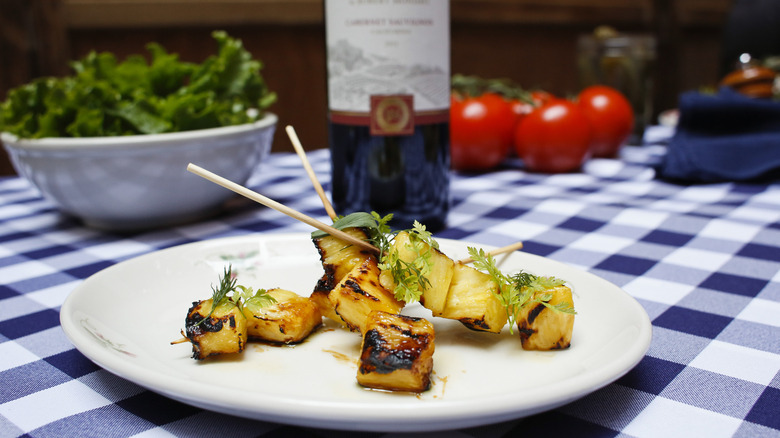Everything You Need To Know Before Buying Your First Grill
We may receive a commission on purchases made from links.
Summer is coming, which means it's grilling season. Outdoor grilling is a great way to feed family and friends in a social, fun way. Playing some music and popping some food on the grill makes even the most mundane afternoon into a party. If you want to go from BBQ attendee to owning your own grill, here's what you need to know before getting fired up.
Grills can cost less than $50 for a simple setup that can be taken to campsites and tailgates to tens of thousands of dollars for a custom home setup. Grills also vary in the way they're heated, but charcoal, gas, and electric are the most common forms of heat source. With all these options, how can you find the grill that's right for you and your family?
There are a few things to consider before you shop. First, how many people will you typically be grilling for? Do you plan on becoming the grill master for your large family or will you just be throwing a few burgers on the fire for yourself and a significant other? When thinking about the size of a grill, generally plan for about 100 square inches of grill space per person (that's 10 inches x 10 inches).
You should also consider your budget. Prices range greatly, so expect to pay about $100 to $300 for a charcoal or electric grill and $200 to $400 for a gas grill, with prices increasing for more bells and whistles, says Coupon.com.
Types of grills to know
The next thing to consider is whether you want to purchase an electric, gas, or charcoal grill.
In a Home Depot comparison of gas and charcoal grills, gas grills heated up considerably quicker. With a gas grill, you simply turn on the gas source — usually a propane tank — and get started. With a charcoal grill, the coals need to heat up for about 30 minutes before optimal cooking heat is achieved, Home Depot found. Cleanup is also easier with a gas grill, since the ash that accumulates in a charcoal grill needs to be disposed of once completely cooled. Both grills, of course, need to be maintained, cooking surfaces need to be cleaned, and the lines to a gas grill need to be checked on a regular basis.
While electric grills are less popular than the above two choices, they're perfect for apartment dwellers. Most apartment and condo buildings prohibit the use of charcoal and gas grills for the smoke and potential fire hazard they can provide. Bbqbarbecuegrill.com says that electric grills heat up quickly, take up little space, and can even serve as a substitute for oven cooking.
Different grills, different flavors
Different grills also produce different flavor results. If you're grilling a variety of items and want to cook your food outdoors, Own the Grill suggests a gas grill. If you prefer a smokier flavor, a charcoal grill is a good choice for you. Different woods like mesquite and apple wood can also be added to your charcoal to impart different flavors. Barbecuefaq.com suggests adding wood chips like pecan or cherry to your coals by placing them in an aluminum foil "vessel". This lets the wood smoke instead of simply burning up quickly.
It takes time to become a master griller, but learning to grill involves mastering just a few basics. Make sure your grill is preheated. Don't overcrowd the grill. Leave about a quarter of the grill's heating space free so you have room to move and turn your items.
Now that you've decided on a grill, don't save it for a big weekend cookout. You can use your grill for a surprising number of items. Sure, a grill is great for burgers and chicken, but think outside the box. Grill tofu and vegetables for a meat-free barbecue or lightly grill some fruit kebabs for dessert. Even pizzas and quesadilla turn out great on a grill!


